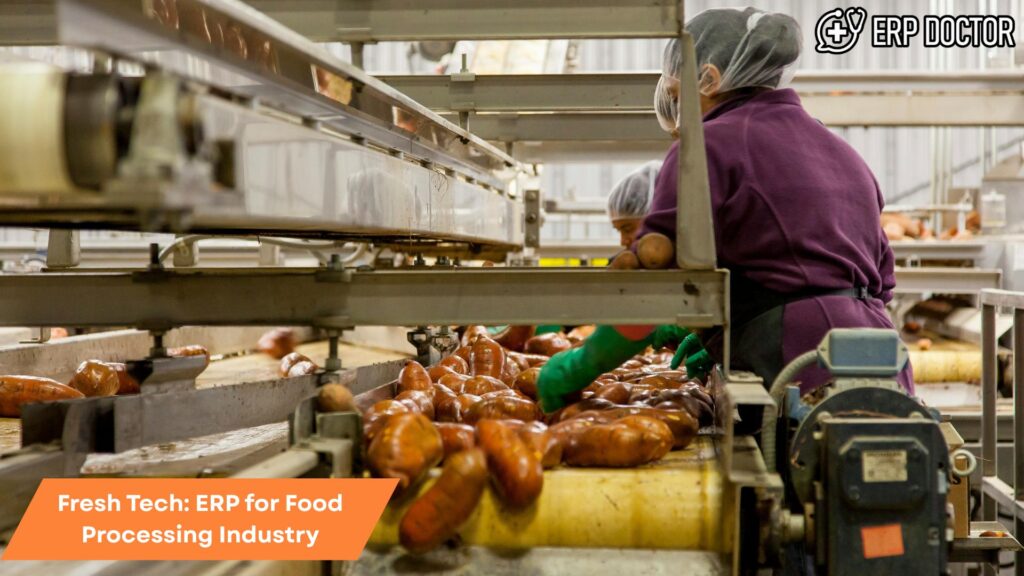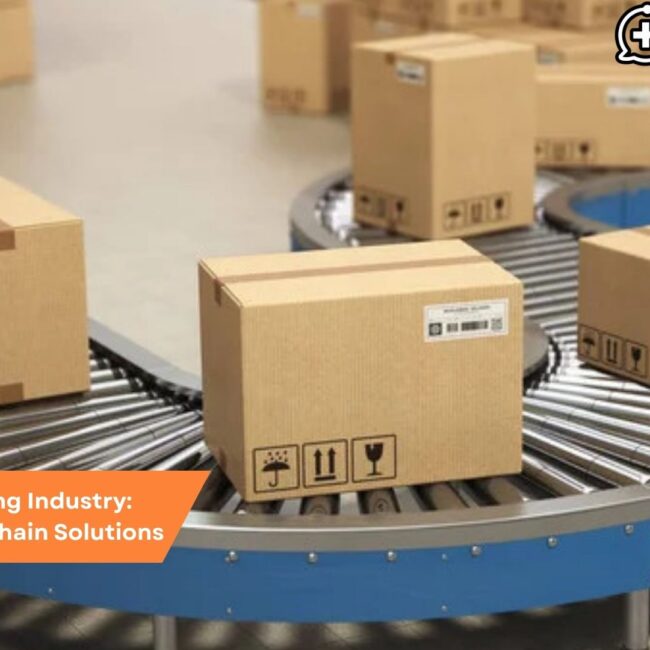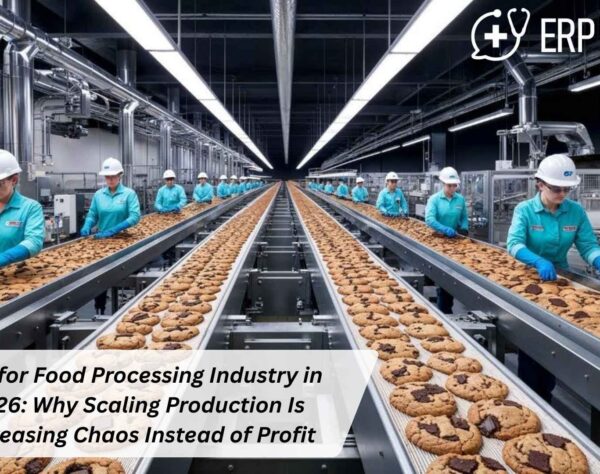
Fresh Tech: ERP for Food Processing Industry

How ERP Solutions Are Revolutionizing the Food Processing Industry
The Food Processing Industry is a fast-paced, highly regulated sector that demands precision, efficiency, and full traceability at every stage. Whether it’s raw material sourcing, batch production, quality control, or distribution, every link in the supply chain must be seamlessly connected. That’s where ERP—Enterprise Resource Planning—enters the picture. More specifically, ERP for Food Processing Industry is transforming how producers manage operations, ensure safety, and meet compliance.
In this post, we’ll explore how specialized ERP Solutions for Food Processing Industry are changing the game, the role of a trusted ERP Software Company, and why choosing the right ERP Solution Provider is key to unlocking full operational value.
Why the Food Processing Industry Needs ERP
The Food Processing Industry faces unique challenges that require industry-specific tools. Frequent regulatory changes, perishable goods, allergen control, and the need for end-to-end product traceability make traditional management systems outdated and risky.
That’s why modern businesses are turning to ERP for Food Processing Industry—not just to stay compliant, but to thrive in a data-driven market.
Key Benefits of ERP in Food Processing Industry
- Traceability and Compliance
An advanced ERP Solution for Food Processing Industry tracks ingredients from farm to fork. It helps maintain records for audits, manage allergens, and ensure regulatory compliance. - Inventory and Batch Management
ERP streamlines inventory control with real-time tracking, FIFO/LIFO support, expiration alerts, and precise batch tracking—all essential in food processing. - Quality Assurance
With embedded quality control features, ERP Solutions for Food Processing Industry monitor temperature logs, sampling, and lab tests, ensuring only safe, high-quality products leave the plant. - Production Efficiency
ERP systems automate recipe scaling, production scheduling, and waste reduction, making food operations more predictable and less prone to errors. - Integrated Supply Chain
ERP for Food Processing Industry connects vendors, warehouses, logistics, and retailers in one platform, eliminating silos and enhancing communication.
How ERP Solutions for Food Processing Industry Work
ERP Solutions for Food Processing Industry aren’t generic software tools—they’re engineered to handle the granular complexities of food production. This includes:
- Recipe and formula management
- Allergen and nutrition labeling
- Recall management
- Batch tracking and lot traceability
- Real-time analytics dashboards
These features are best implemented with the help of a skilled ERP Solution Provider who can configure the system based on your operational structure.
Role of an ERP Software Company in Food Processing
A reliable ERP Software Company brings more than just software to the table. They offer deep industry insights, customization services, integration expertise, and long-term support.
A professional ERP Software Company helps food processors:
- Map current processes and identify inefficiencies
- Choose and configure the right modules
- Train staff and streamline adoption
- Integrate ERP with IoT, barcode systems, and quality equipment
The right ERP Solution Provider ensures that the ERP system doesn’t disrupt but enhances your operations.
Real-World Outcomes of ERP in the Food Sector
Companies using ERP for Food Processing Industry report significant improvements:
- 40% faster order fulfillment
- 25% reduction in material waste
- 30% more accurate forecasting
- 50% faster recall handling time
These efficiencies directly impact profit margins and brand trust—critical in a highly competitive space like the Food Processing Industry.
Customization Is Key
No two food businesses operate the same way. That’s why ERP Solutions for Food Processing Industry must be tailored. Whether it’s integrating cold storage monitoring or automating nutrition label generation, the system must fit your exact needs.
Partnering with a forward-thinking ERP Software Company ensures your ERP system evolves with your business.
Choosing the Right ERP Solution Provider
Here’s what to look for in a trusted ERP Solution Provider for food processing:
- Experience in the Food Processing Industry
- Custom development capabilities
- Integration with quality and regulatory systems
- Ongoing support and scalability
A good ERP Solution Provider will not just install software—they’ll become a strategic partner.
Final Thoughts
As consumer expectations grow and regulations become stricter, food manufacturers can no longer afford inefficiencies or manual systems. Modern ERP Solutions for Food Processing Industry deliver the traceability, control, and automation needed to succeed.
Whether you’re running a dairy plant, meat processor, or ready-to-eat facility, the right ERP for Food Processing Industry, deployed by a skilled ERP Software Company or ERP Solution Provider, can revolutionize your operations from the ground up.
In today’s competitive market, adopting the right ERP system isn’t just about keeping up—it’s about staying ahead.
FAQs: ERP for Food Processing Industry
Q1: Can ERP systems manage food recalls efficiently?
Yes, ERP systems with batch tracking and traceability can identify affected products quickly for efficient recall execution.
Q2: How does ERP help manage allergen risks in production?
ERP allows tagging and segregation of allergen ingredients, preventing cross-contamination during production.
Q3: Can ERP integrate with temperature-controlled storage?
Yes, many ERP systems support IoT integration to monitor cold storage conditions in real time.
Q4: Is ERP suitable for small food processing businesses?
Yes, ERP can be scaled and customized for small operations needing efficiency and compliance.
Q5: Does ERP support multi-site production operations?
Absolutely. ERP systems can manage multiple production units and warehouses under a single platform.
Q6: What kind of quality checks can ERP handle in food processing?
ERP can track lab results, in-line checks, and inspection reports across different production stages.
Q7: Can ERP help optimize recipe or formula management?
Yes, ERP can manage versions, scale batches, and ensure consistent ingredient usage.
Q8: How does ERP improve supply chain visibility in food processing?
ERP connects vendors, logistics, and production, offering real-time status of materials and finished goods.
Q9: Does ERP support real-time reporting for food operations?
Yes, ERP provides customizable dashboards with live data on production, inventory, and compliance.
Q10: What role does an ERP Solution Provider play in post-deployment?
They offer system maintenance, updates, user training, and help align ERP with changing business needs.





